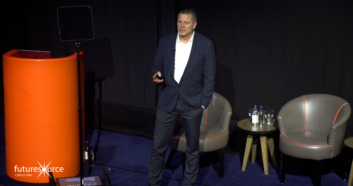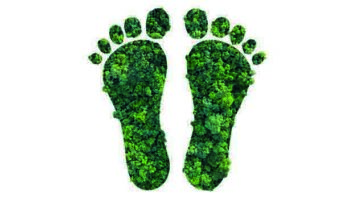Sustainability is an issue that has featured regularly on broadcast technology conference programmes in recent years but is usually confined to a specific session. This is now beginning to change as the broadcasting and general media sector comes to realise that ecological awareness should fundamentally inform not only its operations but also the manufacture and distribution of the equipment it uses. The recent Audio Collaborative event in London reflected this, with the need to work in a sustainable way discussed by many of the panels, not just those dedicated to the subject.
 This year’s event, organised by media research consultancy Futuresource, was the first ‘in-person’ conference since 2019. As at that last event, the opening keynote for 2022 was given by Carsten Olesen (pictured), president of consumer audio at Harman International. Sustainability featured heavily in his presentation and follow-up ‘fireside chat’. It was, he said, one of the three main issues influencing audio technology today, together with data and AI (artificial intelligence) and the metaverse.
This year’s event, organised by media research consultancy Futuresource, was the first ‘in-person’ conference since 2019. As at that last event, the opening keynote for 2022 was given by Carsten Olesen (pictured), president of consumer audio at Harman International. Sustainability featured heavily in his presentation and follow-up ‘fireside chat’. It was, he said, one of the three main issues influencing audio technology today, together with data and AI (artificial intelligence) and the metaverse.
Picking up the point about “sustainable innovation”, Olesen said, “Our presence on the planet changes the natural world and is a threat to the environmental world. Our industry has a role to play and it must play that role.” Examples of people and organisations in the audio and music business who were doing this, he added, were the charity Earth/Percent, A Greener Festival, Julie’s Bicycle and former REM singer Michael Stipe, who, in September this year, released the world’s first bioplastic 12-inch record. With the EU target of climate neutrality set for 2050, Olesen commented that “most hardware manufacturers” were backing sustainability, with initiatives including the recycling of plastics.
Two afternoon sessions were given over to discussing how the audio sector is – or should be – working to make itself more sustainable. This segment was opened by Althea Ricketts, associate vice president of corporate initiatives and sustainability champion at Shure, who delivered a shortened version of a presentation she gives to the sound technology market: ‘Sustainability… What’s in it for the Audio Industry?’ That title appears to be have been at least partly inspired by a comment from a senior audio executive who asked Ricketts what audio had to do with climate change. Ricketts went on to illustrate how much global warming and other environmental concerns should be as much a major consideration for the audio sector as any other area of life.
Beginning with the Webster’s dictionary definition of sustainability – “using a resource so that the resource is not depleted or permanently damaged” and “staying within the bounds of finite resources” – Ricketts set out to look at how that related to the audio industry, including associates, community, product and the environment. “It is a balance of the triple bottom lines,” she said, “people, planet and profit. With community it is about being a good corporate citizen.”
It was also, she added, about “keeping an eye on the future”, with the United Nation’s 17 Sustainable Development Goals providing serious targets for companies and individuals alike. “All the goals have a direct impact on your business,” Ricketts commented. Those most connected to audio are: responsible consumption and production; industry innovation and infrastructure; affordable and clean energy; decent work and economic growth; climate action; life on land; life below water; clean water and sanitation; and sustainable cities and communities.
Ricketts revealed that what keeps her up at night is the thought of e-waste, the growing amount of electrical and electronic devices that are discarded either wholly or in part. The Greenpeace Guide to Greener Electronics (first published in 2017) set out how manufacturers could take responsibility for the supply chain footprint, design sustainable products and also be responsible for the “end of life chain”. This last point includes repairing or refurbishing equipment, with Apple setting an example through its Daisy recycling robots. Ricketts encouraged people to “start asking questions” and concluded by quoting the late British environment minister Michael Meacher: “Forward thinking companies that adapt positively to the sustainable business agenda will be at the forefront of resource productivity, reducing waste and of environmental reporting.”
The following panel discussion Sounding Out on Sustainability featured Ricketts, Dom Robinson, co-founder of international awareness forum Greening of Streaming; Andy Dowell, head of licensing at rendering technology developer MQA; and moderator Chris Carey of research agency Opinium. Responding to the question of how big a problem streaming posed in terms of sustainability, Robinson gave the bald statistic that it consumes between one and two per cent of world energy, which is the same as the aviation sector. “Not everything needs to be delivered at 8K UHD,” he said. “We need to optimise energy. Lord of the Rings works in UHD but it’s not necessary for eight channels being shown in a pub with only one person watching. For passive viewing, 2K AAC would be preferable.”
Dowell pointed out that demand for video streaming increased dramatically during the pandemic, with resultant wastage due to large amounts of information being sent with HD masters. “The music industry has led the way in delivering studio quality files to the consumer,” he added. “If someone is listening to a track through streaming, it would have been better if they’d bought the CD or cached the song on their device.” Dowell observed that a more sustainable and efficient way of working would be to store the world catalogue of music in a central location. Robinson added that such an arrangement, which would call for only the metadata about each track to be distributed, would be “more lightweight” in terms of energy consumption. “Inefficiency in network services is making someone money,” concluded Robinson, “and they don’t want to change that. We’ve got to get people to turn stuff off.”
The sustainability sessions at Audio Collaborative 2022 showed that serious advances had been made in reducing both power consumption and wastage – with companies such as Shure reassessing not only how it packaged its products but also how that packaging was recycled – but it was clear that more had to be done by more people in the audio industry.







